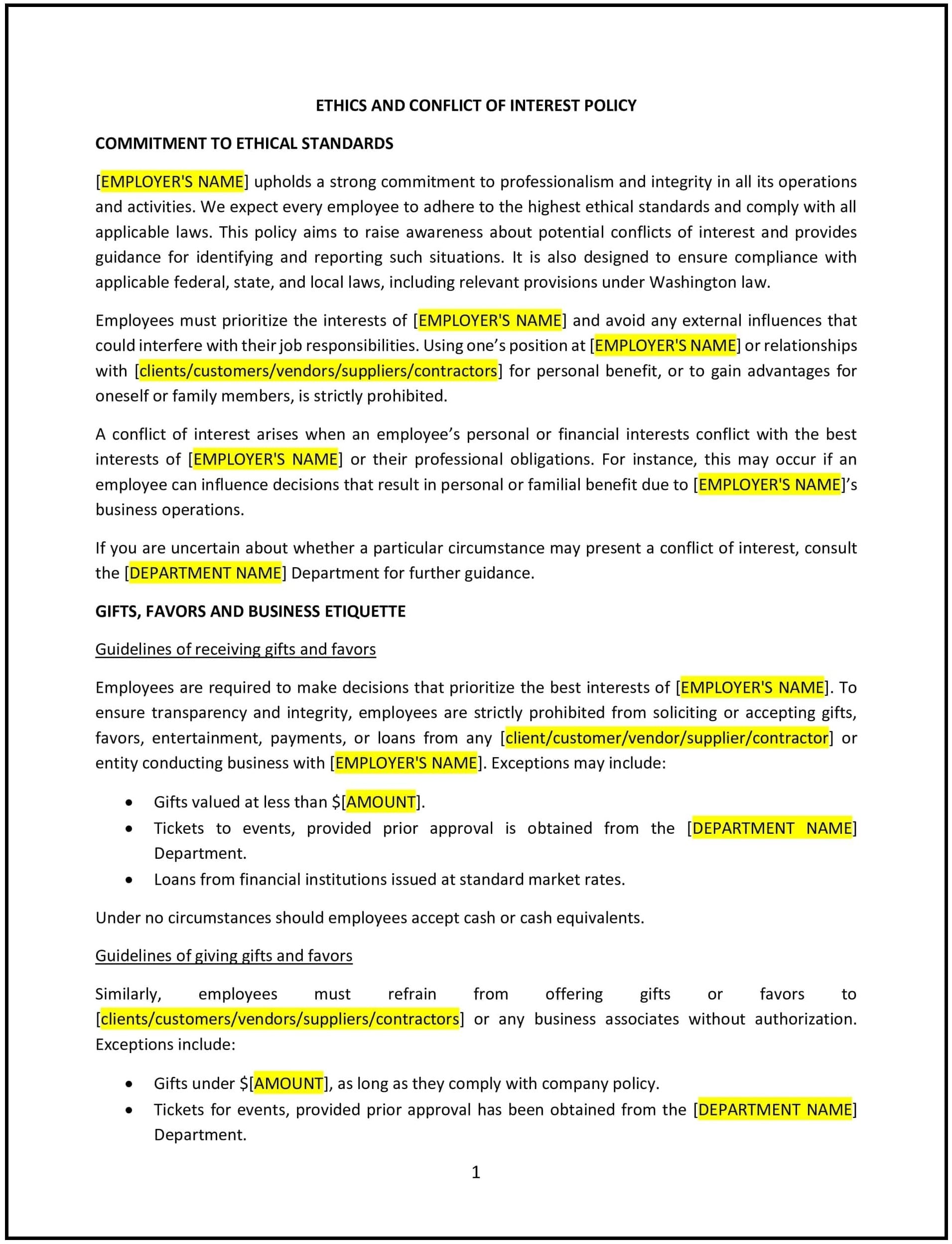Ethics and conflict of interest policy (Washington): Free template
Got contracts to review? While you're here for policies, let Cobrief make contract review effortless—start your free review now.

Customize this template for free
This ethics and conflict of interest policy is designed to help Washington businesses establish clear guidelines for ethical conduct and prevent conflicts of interest in the workplace. The policy outlines the company’s expectations for employees’ behavior, focusing on maintaining integrity, transparency, and fairness in all business dealings. It also provides guidelines for identifying, disclosing, and managing any potential conflicts of interest that could compromise the company’s reputation or lead to unethical decisions.
By adopting this policy, businesses can promote a culture of honesty and accountability, reduce the risk of unethical behavior, and ensure that all business decisions are made in the best interest of the company and its stakeholders.
How to use this ethics and conflict of interest policy (Washington)
- Define ethical conduct: Clearly outline the company’s expectations for ethical behavior, including honesty, integrity, fairness, and transparency in all business dealings. Employees should be aware that they are expected to act in the company’s best interest and avoid any actions that could be seen as self-serving or dishonest.
- Identify potential conflicts of interest: Provide examples of situations that may constitute a conflict of interest, such as employees having financial interests in competitors, suppliers, or clients. The policy should clarify that any personal interests that interfere with an employee’s ability to perform their duties objectively must be disclosed.
- Establish disclosure procedures: Require employees to disclose any potential conflicts of interest, either upon hiring or when such situations arise during employment. Employees should know how to report conflicts and to whom they should report them, ensuring confidentiality and transparency.
- Outline management of conflicts: Provide guidance on how conflicts of interest will be handled once disclosed. This may include steps for recusal from decision-making processes, reassignment of duties, or, in extreme cases, termination of employment if the conflict is severe.
- Address gifts and entertainment: The policy should specify the company’s stance on accepting or offering gifts, entertainment, or other favors that could be perceived as attempts to influence business decisions. It should outline acceptable thresholds for gifts and specify when gifts or hospitality are considered inappropriate.
- Set expectations for external relationships: The policy should address potential conflicts of interest arising from employees’ relationships with outside organizations, such as board memberships, consulting work, or family relationships with clients or suppliers. Employees should be informed that outside activities that conflict with the company’s interests should be disclosed.
- Promote compliance with Washington and federal laws: The policy should align with Washington state laws and federal regulations regarding ethics and conflicts of interest, including laws governing government employees, public officials, and businesses operating in regulated industries.
- Review and update regularly: Periodically review and update the policy to ensure it remains compliant with changes in Washington state laws, federal regulations, or the company’s operations. Regular updates ensure that the policy reflects the company’s evolving needs and legal requirements.
Benefits of using this ethics and conflict of interest policy (Washington)
This policy offers several benefits for Washington businesses:
- Promotes ethical decision-making: By providing clear guidelines on ethical behavior and conflicts of interest, the policy helps ensure that employees make decisions that align with the company’s values and best interests.
- Reduces legal and reputational risks: A strong ethics policy helps businesses avoid situations that could lead to legal liabilities or damage to the company’s reputation, such as accusations of favoritism, bribery, or corruption.
- Enhances transparency and accountability: The policy encourages openness and accountability within the organization, ensuring that employees disclose any potential conflicts and that these conflicts are handled appropriately.
- Improves employee trust and morale: Employees are more likely to trust and feel confident in their employer when they know that the company has a clear commitment to ethical practices and fair treatment. This can lead to higher employee morale and retention.
- Fosters a positive workplace culture: A commitment to ethics and conflict resolution helps create a workplace culture of fairness, trust, and respect, which in turn improves collaboration and productivity.
- Supports compliance with laws and regulations: The policy helps ensure that the business remains compliant with Washington state and federal laws, reducing the risk of legal challenges or regulatory issues.
Tips for using this ethics and conflict of interest policy (Washington)
- Communicate the policy clearly: Ensure that all employees understand the company’s ethical standards and conflict of interest guidelines. Include the policy in the employee handbook, review it during onboarding, and provide regular reminders.
- Provide training: Offer training to employees on how to recognize and disclose conflicts of interest, and the importance of ethical behavior in the workplace. Ensure that employees understand the company’s commitment to integrity and fairness.
- Monitor compliance: Regularly assess whether employees are adhering to the policy and address any concerns or violations promptly. The company should have procedures in place for investigating potential conflicts of interest or unethical behavior.
- Address violations promptly: If a conflict of interest or unethical behavior is identified, address the issue swiftly and fairly. This may involve removing employees from certain decision-making processes or taking other corrective actions as needed.
- Encourage open reporting: Create a safe environment where employees feel comfortable reporting potential conflicts of interest or unethical behavior without fear of retaliation. The policy should specify how employees can report concerns confidentially.
- Review and update regularly: Periodically review the policy to ensure it remains compliant with Washington state laws, federal regulations, and any changes in the company’s operations. Regular updates will help keep the policy relevant and effective.